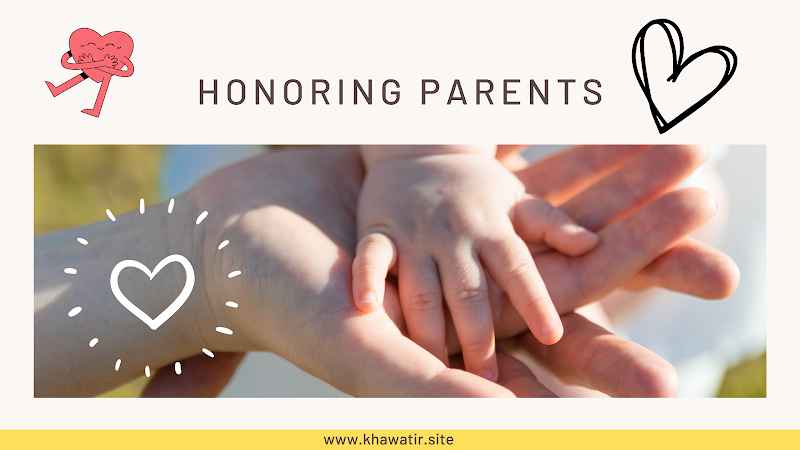Honoring Parents
honoring and respecting one's parents is not just a cultural norm but a fundamental principle deeply rooted in religious teachings. The Quran and the Hadith emphasize the importance of showing kindness, compassion, and obedience to parents, regardless of their age or circumstances. Honoring parents is considered one of the most virtuous acts a person can perform, and it is rewarded both in this life and in the Hereafter.
The Quranic Commandments Regarding Parents
The Quran contains numerous verses that underscore the significance of honoring parents and treating them with utmost respect and kindness. For example, in Surah Al-Isra, verse 23, Allah says: "And your Lord has decreed that you not worship except Him, and to parents, good treatment. Whether one or both of them reach old age [while] with you, say not to them [so much as], 'uff,' and do not repel them but speak to them a noble word." This verse highlights the obligation of showing kindness and respect to parents, even in situations where they may be difficult or demanding. It emphasizes the importance of speaking to them gently and refraining from any form of disrespect or disobedience.
The Prophetic Tradition of Honoring Parents
The teachings of the Prophet Muhammad (peace be upon him) further reinforce the importance of honoring and respecting parents. He emphasized that paradise lies at the feet of mothers, highlighting the elevated status of mothers in Islam. The Prophet also stressed the significance of obeying parents and serving them dutifully, regardless of the circumstances. In one Hadith, the Prophet Muhammad (peace be upon him) said: "He is not one of us who does not have mercy upon our young ones and does not honor our elders." This Hadith underscores the importance of showing compassion and respect to both the young and the old, including parents and elders within the community.
Practical Ways to Honor Parents , Honoring parents can take many forms, including:
Respectful Speech: Speaking to parents with kindness, humility, and patience, avoiding any form of rudeness or disrespect. Physical Assistance: Providing practical help and assistance to parents, especially in their old age, by helping with household chores, running errands, or accompanying them to appointments. Emotional Support: Offering emotional support and companionship to parents, listening to their concerns, and comforting them during times of distress. Prayers and Supplications: Making sincere prayers and supplications for the well-being, health, and happiness of parents, both in this life and in the Hereafter.
Honoring parents is a sacred duty and a cornerstone of Islamic ethics and morality. It is a reflection of one's faith and devotion to Allah, as well as a means of earning His pleasure and blessings. By fulfilling this obligation with sincerity and devotion, Muslims can uphold the sanctity of family ties and contribute to the establishment of a righteous and compassionate society. Honoring parents is a sacred duty and a cornerstone of Islamic ethics and morality. It is a reflection of one's faith and devotion to Allah, as well as a means of earning His pleasure and blessings. By fulfilling this obligation with sincerity and devotion, Muslims can uphold the sanctity of family ties and contribute to the establishment of a righteous and compassionate society.
In Islam, parents hold a revered status, and their rights are paramount. The Quran and the teachings of Prophet Muhammad emphasize the importance of showing kindness, respect, and obedience to one's parents. This duty extends beyond mere material support to encompass emotional care, companionship, and reverence.
The Quran states, "And your Lord has decreed that you not worship except Him, and to parents, good treatment. Whether one or both of them reach old age [while] with you, say not to them [so much as], 'uff,' and do not repel them but speak to them a noble word" (Surah Al-Isra, 17:23). This verse underscores the obligation to treat parents with utmost kindness and respect, even in the face of challenges or disagreements.
Honoring parents is not only a religious obligation but also a moral imperative. It teaches humility, gratitude, and empathy, instilling virtuous qualities in individuals and fostering harmonious relationships within families and communities. By fulfilling this duty, Muslims uphold the values of compassion, generosity, and mutual support that are essential for building a cohesive and compassionate society.
Furthermore, honoring parents serves as a source of spiritual enrichment and blessings. In Islam, it is believed that acts of kindness and obedience towards parents are rewarded manifold by Allah. The Prophet Muhammad (peace be upon him) emphasized the significance of serving parents, stating, "Paradise lies beneath the feet of your mother" (Sunan Ibn Majah). This profound Hadith highlights the elevated status of parents in Islam and the immense blessings associated with fulfilling their rights.
In conclusion, honoring parents is a sacred obligation in Islam that holds immense spiritual and moral significance. By fulfilling this duty with sincerity and devotion, Muslims uphold the sanctity of family bonds and contribute to the establishment of a righteous and compassionate society. It is through acts of kindness, respect, and obedience towards parents that individuals can earn the pleasure and blessings of Allah, thereby enriching their lives and communities with love, compassion, and harmony.









